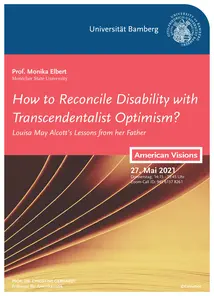Prof. Monika Elbert (Montclair State University): "How to Reconcile Disability with Transcendentalist Optimism?: Louisa May Alcott’s Lessons from her Father"
Thursday, May 27, 2021, 2:15-3:45 p.m., online lecture
Zoom-Call ID: 945 6137 8261 (opens at 2 p.m. sharp)
In her best known novels for the adolescent publishing market, Little Women (1868, 1869) and its sequel Little Men (1871), Louisa May Alcott takes a cue from her famous Transcendentalist father, Bronson, that education could be the great equalizer for children of different classes and of different skills, including children with disabilities. Obviously, Beth in Little Women, becomes the epitome of the soft-spoken gentle girl who, perhaps due to her unselfishness and sensitivity, falls ill with scarlet fever after her extension of generosity to the immigrant German family, the Hummels. In many ways, Beth serves as the protagonist Jo’s better self: “Beth is my conscience, and I can’t give her up.” Beth’s invalidism becomes a learning tool for the March sisters, but it is also seen as a feminine handicap that women must avoid to fully experience a sense of self. Alcott presents handicaps somewhat differently in Little Men: various boys in the school that Jo and her husband Professor Bhaer have established suffer from different disabilities, but these handicaps have sensitized them (with the exception of Dan, who doesn’t appear to be permanently hurt or “tamed” by his foot injury).
Alcott's sentimentalization of disability abruptly comes to an end when she visits New York City. It is only when Alcott takes on the role of an amateur journalist in her visit to Randall’s Island in New York (as recorded in her "A New Way to Spend Christmas," Youth’s Companion, March 1876) that she gets to the heart of urban despair. Of the forty girls she observed, thirty-one were suffering from the "blight of poverty" quite visibly—with defective eyes, deformities, and handicaps. At times Alcott would sentimentalize her desire to help: "I longed to take these young creatures into some safe corner to grow up in the sunshine and pure air they needed" (266)—perhaps emanating from the same desire that the contemporary child welfare advocate Charles Loring Brace showed in conveying the poor orphaned children into the country (which did prove controversial), but perhaps more related to her upbringing by her Transcendentalist father, with his appreciation of Nature, and to her revered mother's sense of nurturing. The sketch's most horrific image centers upon Alcott attempting to give a doll to one of the ailing bandaged children, but "there was no hand to grasp it." The possibilities of genteel poverty (of Alcott's Concord) give way to realistic and depressing moments on the streets of New York.
In addition to analyzing Alcott's two best-known novels and her city sketches, Prof. Elbert also examined several essays from the popular nineteenth-century journal, Godey's Lady’s Book, to show differing views of charity and depictions of disability based on social class structure and on urban versus rural landscapes.
Monika Elbert is Professor of English and Distinguished University Scholar at Montclair State University, N.J. and editor of the Nathaniel Hawthorne Review. She has published widely on the American Romantics, including Hawthorne, Margaret Fuller, and Poe, and on nineteenth-century women writers, on children’s literature, and on Gothic writers. Her co-edited American Women’s Regionalist Fiction: Mapping the Gothic, which includes her essay, "Alice Cary’s Mundane Musings and Rural Hauntings," was published January, 2021, in the Palgrave Macmillan Gothic series, and her edited collection Hawthorne in Context, Cambridge UP, was published in 2018.
